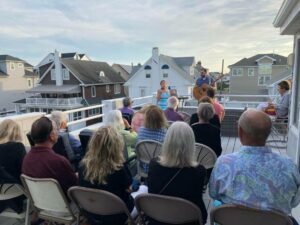
After Shavuot on May 25, there isn’t another major Jewish holiday until Rosh Hashanah on Sept. 15. It’s almost as if God wants to take a summer break and go down the shore with the rest of Jewish Philadelphia.
Rest assured, area rabbis have said. God doesn’t need a tan or some good (kosher) seafood, but the gap between Jewish holidays can be explained.
“We started out as an agricultural people, so many of our holidays, and Torah holidays especially, are according to the seasons,” Congregations of Shaare Shamayim Rabbi Sandra Berliner said.
Sukkot and Shavuot are celebrations of the harvest in Israel, and Passover is a marking of spring. Rosh Hashanah and Yom Kippur correspond to the beginning of the Hebrew calendar. But over the summer, “there’s not a lot happening then,” Berliner said. In Israel, farmers are busy tending to crops.
There is another category of holidays, beyond biblical ones, that Jews observe, according to Congregation Beth Or Rabbi Gregory Marx. July 26-27 marks Tisha B’Av, or the 9th of the Hebrew month Av, the commemoration of the destruction of the two Temples in Jerusalem, as well as other atrocities against Jewish people. Jews often observe the holiday with a fast.
Tu B’Av takes place a few days later on the 15th of Av and is often referred to as “Jewish Valentine’s Day,” as it’s a celebration of love and courtship in Israel. It is meant to contrast the sadness of the destruction of the temples, but it also aligns with Israel’s grape harvest in late summer.
Tied to historical events that happened to take place over the summer, it could be kismet that these historical holidays fill in the gaps of the biblical ones, Marx posited.
“History works itself out either according to the Divine plan, or circumstances, depending upon your perspective,” he said.
Rabbi Abe Friedman of Temple Beth Zion-Beth Israel has a different theory. Until the creation of American Jewish summer camps, Friedman argued, these holidays were often forgotten in the U.S.
“In the [19]30s ’40s, ’50s, you get your summer camps, and for the educators who are starting the summer camps, it’s a laboratory. It’s a place to offer American kids a purely 100% Jewish experience,” he said. “Except there’s no holidays.”
Observances of Tisha B’Av became popularized during this time as a way for summer camps to engage young Jews and rally them around Jewish ritual. Camps like Camp Ramah, where Friedman attended, were grounded in Zionism, and observing holidays commemorating historical events was in line with their values and mission.
“To this day, if you ask anybody, like me, who’s a summer camp lifer, what are the five most important moments over the course of a summer, Tisha B’Av is going to make that list for just about everyone,” Friedman said.
The rabbi still remembers his fellow Camp Ramah kids in Palmer, Massachusetts, gathering on the camp’s basketball court bleachers surrounded with sand and candles. Each camper brought flashlights for the evening ceremony. The camp even accommodated those fasting with a late evening dinner.
But without the magic of summer camp, and with so many congregants down the shore over the weekend or on vacation, synagogues have a harder time bringing Jews together to commemorate these holidays.
Rabbi Geri Newburge of Main Line Reform Temple has learned to accept the summer’s different rhythm, which means smaller Shabbat services, a theme for most area synagogues. Instead, she embraces the consistency of the Jewish calendar as an opportunity for learning.
Newburge draws on the wisdom of Jewish writer Achad Ha-Am: “More than the Jewish people have kept Shabbat, Shabbat has kept the Jewish people.”
The Torah stays the same, but year after year, Jewish students return to the sacred text as changed people. Jewish holidays, even ones often overlooked, work similarly.
Over the summer, Newburge doesn’t care as much about the number of attendees but hopes that the congregants who show up to MLRT’s Tisha B’Av programming come curious and interested. And if they don’t, there’s always next summer.
“We may come and go to it either individually or collectively in different ways at different periods of time,” Newburge said. “But it is always there for the taking.”






